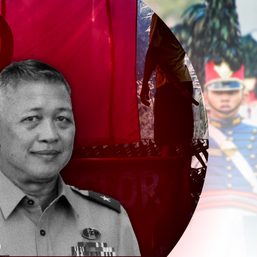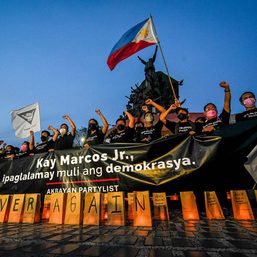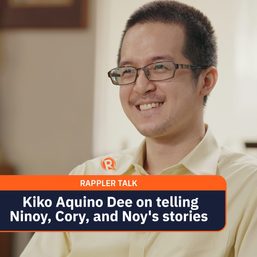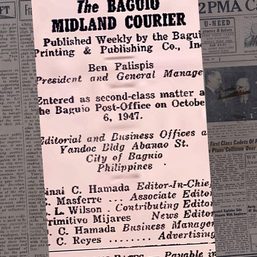SUMMARY
This is AI generated summarization, which may have errors. For context, always refer to the full article.
![[Newspoint] The challenge of unsavory company](https://www.rappler.com/tachyon/2024/02/tl-unsavory-company.jpg)
Not since the battle of EDSA has civil society faced, as it faces today, a comparable challenge of having to enter into a tactical alliance with unsavory company.
It was in that battle, fought 38 years ago this month, that civil society had its shining moment, turning out in a critical mass to end, by street protest vigil, Ferdinand Marcos’ 14-year reign of torture, murder, and plunder. But, as part of the deal, it had to swallow Juan Ponce Enrile.
It was Enrile who, by faking an ambush on himself and blaming it on the communists, had given Marcos the pretext for his martial rule, only to turn against him in order to wrest power for himself. Found out before he could mount his coup, he had to go back for rescue to the nation he had betrayed, lighting the spark for EDSA.
Indeed, Enrile’s has been a long life of betrayals. Soon after he switched sides, his forces tried, seven times, to topple the democratic presidency of Marcos’ successor, Cory Aquino. If there still remains any confusion as to where Enrile’s heart belongs, as a matter of principle, as it were, it should be decidedly dispelled now. And what a perfect occasion for a summing-up – he is turning 100, and right on the day of hearts, the 14th!
Juan Ponce Enrile comes full circle from Marcos’ chief collaborator to legal counsel to Marcos’ son, the present president, filling the interim with service to three presidents of more or less the Marcos mold – Joseph Estrada, Gloria Arroyo, and Rodrigo Duterte.
Duterte, the last previous president, happens also to be the odious challenge today that Enrile was – a turncoat diving into the arms of the good guys for the moment’s convenience. This time the issue on which occurs such an abnormal intersection of positions is constitutional change. Duterte himself pushed for it during his term, and his motive could not have been any different from that of the others – to stay in power beyond his term in order to escape prosecution for his regime’s excesses.
Unable to pull off the trick, and with his daughter the vice president, his fallback hope, now in danger of her own chance at the next presidency being sabotaged by the same trick, he is beginning to sound rather desperate. He has called for the secession of Mindanao, one of the archipelago’s three main islands, whose premier city, Davao, serves as his dynastic base.
It’s another of his self-reversals. He did not support the secessionist campaign when it was active – and it had been hot for decades, in fact pushed along by force of arms – and neither did he have anything to say when his island’s Muslim-dominated region was granted autonomy. Reacting to his outdated espousal, top officials of the region say its citizens are quite content with the compromise – autonomy for the renunciation of secessionism.
Loud, impulsive, and vulgar, Duterte remains a challenge even only as an insistent voice, and with Senator Imee Marcos duetting with him, the challenge is doubled. Apparently excluded from the political plotting by her brother, the President, and their cousin Martin Romualdez, the Speaker, from whose very House the idea of constitutional change went out precooked, she is taking her chances with the Dutertes, who, until her family dropped them from the coalition, had been the other half of it. Favored further by the lack of a potent political opposition, she and Duterte have found a void for themselves to fill.
The spectacle is so insane it just as well suits the superficial orientation of most of the news media; thus an issue that bears on the democratic existence no less of the nation is misrepresented and confused in a noisy, self-centered quarrel among opportunists. Meantime, cause-driven personages and groups are left largely on their own to propagate their selfless position.
And they seem doing what they can across platforms available to them, sending out warnings against letting the contaminated hands of politicians touch the constitution. An initial blast in an online show of force put out a list, running to more than 50 text lines, of redoubtable individuals and groups, notably from the church, an eminent force at EDSA. Still, nothing beats a massive street deployment, and this historic EDSA month is just the perfect time for one.
But again, it can’t stop there; it can’t stop at all, not in the face of such shameless sense of opportunism as has developed among politicians. For the people to be able to exercise ultimate power at will and in every practical way, as intended in any democracy, civil society will have to organize itself into a constituency that constitutes a swing force and from which a critical mass of warm, fervid bodies may be deployed any time. The strategy has worked not only at EDSA, but elsewhere in the world.
For one thing, that should shut out such unsavory company as Enrile, Duterte, and Marcos. – Rappler.com
1 comment
How does this make you feel?




![[Closer Look] ‘Join Marcos, avert Duterte’ and the danger of expediency](https://www.rappler.com/tachyon/2024/06/TL-trillanes-duterte-expediency-june-29-2024.jpg?resize=257%2C257&crop_strategy=attention)
![[Newspoint] A Freedom Week joke](https://www.rappler.com/tachyon/2024/06/20240614-Filipino-Week-joke-1.jpg?resize=257%2C257&crop_strategy=attention)


![[In This Economy] Marcos’ POGO ban is popular, but will it work?](https://www.rappler.com/tachyon/2024/07/thought-leaders-marcos-pogo-ban.jpg?resize=257%2C257&crop=255px%2C0px%2C720px%2C720px)
![[Rappler Investigates] POGOs no-go as Typhoon Carina exits](https://www.rappler.com/tachyon/2024/07/newsletter-graphics-carina-pogo.jpg?resize=257%2C257&crop=424px%2C0px%2C1080px%2C1080px)




![[Bodymind] Forgiveness, Enrile, and Bongbong Marcos Jr.](https://www.rappler.com/tachyon/2024/03/forgiveness-enrile-bongbong-march-6-2024.jpg?resize=257%2C257&crop=411px%2C0px%2C1080px%2C1080px)
![[Bodymind] Juan Ponce Enrile’s hundred years of happiness](https://www.rappler.com/tachyon/2024/02/tl-enrile.jpg?resize=257%2C257&crop=233px%2C0px%2C720px%2C720px)
![[In This Economy] Small wins matter in the fight against Martial Law denialism](https://www.rappler.com/tachyon/2024/02/fight-against-martial-law-denialism-February-23-2024.jpg?resize=257%2C257&crop=225px%2C0px%2C720px%2C720px)
![[EDITORIAL] Juan Ponce Enrile: 100-year-old chameleon](https://www.rappler.com/tachyon/2024/02/animated-juan-ponce-enrile-100-carousel.jpg?resize=257%2C257&crop_strategy=attention)
Thanks to writer Vergel Santos for another inspiring article. His statement inspired me: “… civil society will have to organize itself into a constituency that constitutes a swing force and from which a critical mass of warm, fervid bodies may be deployed any time. The strategy has worked not only at EDSA, but elsewhere in the world.” The problem is how? And do you know if it will still work this time?